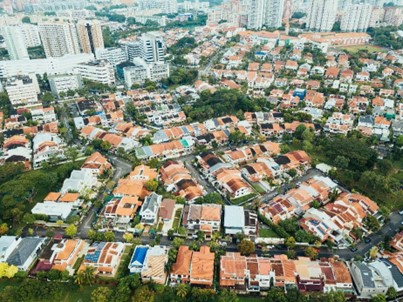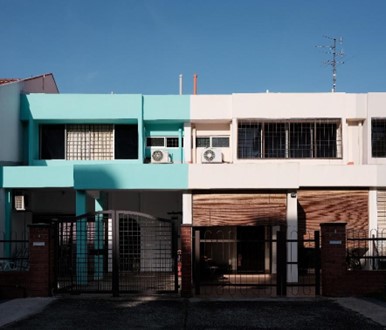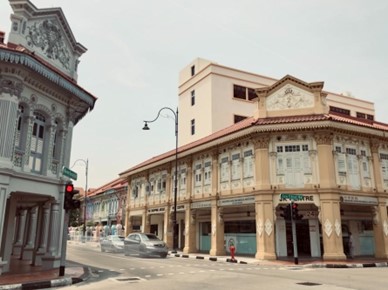As we all know, a large majority of Singapore’s land is owned by the Government. This makes landed property a popular (though expensive) option for many future homeowners.
If you are one of the many who want to own private or landed property in Singapore, yet are confused about the many foreign terms, fret not! Continue reading on, and hopefully, your doubts will be cleared.

What is Private Property?
To make things simple, we will split properties in Singapore to public and private.
Public housing refers to HDBs. Private property refers to Condominiums, Apartments, Executive Condominiums (ECs) and Landed Property.
Now that you know what constitutes as a private property, let’s move on to distinguishing the various types of private property.
Condominiums
A condominium refers to gated complexes not managed by HDB. Owners share communal facilities and areas such as swimming pools, gardens and gyms with other owners in the development.
The development has to satisfy the requirements of being a minimum of 40,000 square feet (sqft).
Executive Condominiums
Executive Condominiums (ECs) are different from condominiums in that they are managed by HDB. ECs cater to Singaporeans who are not qualified to buy a HDB flat, but find private condominiums too expensive.
ECs can be said to be public-private housing. They are considered HDB for the first 10 years, before privatising in year 11. For the first 10 years, HDB rules will thus apply to you when purchasing an EC. This includes the Minimum Occupancy Period of 5 years.
There are more restrictions imposed on you when buying an EC compared to a condominium.
Landed Property
There are several types of landed property. They include terrace houses, semi-detached, Bungalows, Good Class Bungalows, Shophouses and Cluster Housing.
Terrace House

Terrace houses hold their own land title. It consists of a row of at least 3 dwelling houses sharing common walls. There are no dwellings above or below the terrace house.
There are 2 types of terrace houses – distinguished by setback requirements.
Type I Terrace House: Setback is based on standard road buffer requirements
Type II Terrace House: Setback is standardised at 2m for building walls, and 1m for roof eaves
Semi Detached House
A semi-detached house is one that is joined to another similar house on only one side. This wall can either be beside or behind one house.
Terrace houses can be redeveloped into a semi-detached house as long as the plot size and plot width of the new property meets guidelines.
Semi Detached houses have a minimum plot size of 200sqm, with a minimum plot width of 8 metres for side-to-side houses, and 10m for back-to-back semi-detached houses.
Bungalows
Bungalows are regarded as standalone houses on a plot of land. There are 2 types of Bungalows in Singapore – Bungalows and Good Class Bungalows (GCBs).
Good Class Bungalows (GCBs) are known as the finest type of landed property in Singapore due to its prestigious nature.
Good Class Bungalows differ from Bungalows due to several features.
– GCBs must be located within 39 areas gazetted by URA. These are usually nestled in exclusive landed residential areas. (Some of this includes Cluny Hill, Nassim Road, Leedon Park, Caldecott Hill Estate, King Albert Park and Windsor Park.)
-GCBs have to have a minimum plot size of 1,400 square metres
-They cannot be more than 2 storeys high (excluding attics and basements)
-The property must not occupy more than 40% of the overall GCB land plot
Bungalows, although smaller than GCBs, are similarly considered as one of the most prestigious property types someone can own. Bungalows have a minimum plot size of 400sqm and a minimum plot width of 10m.There is a maximum site coverage of 50% imposed on Bungalows.
Shophouses

Constructed between the 1840s and 1960s, shophouses are historically significant in Singapore. There are variations of style – from traditional early shophouse styles to more modern artistic shophouse styles.
Shophouses are narrow, small terraced houses that are two to three storeys high and are gazetted by URA as conservation buildings. Many Shophouses are located in central Singapore, with commercial property at the ground floor, and residential on the upper floors.
If you were to buy a shophouse, do make sure to follow conservation guidelines! Many shophouses hold a conservation status. Some of which include:
- The “3R” Principle should be applied – Maximum Retention, Sensitive Restoration and Careful Repair
- Alterations to structural elements of the shophouse is to be done in the most unobtrusive way, using original methods and materials where possible
- Where replacement is necessary, home owners have to seek URA approval
Cluster Housing
Cluster Housing is like the condominium’s of the landed world. Owners are able to enjoy common facilities such as swimming pools, gym and function rooms that are managed by Management Corporation Strata Title (MCST) and yet able to enjoy the privacy of such properties that comes with it.
Cluster housing holds a strata-title. This means you do not own the land, it is shared with the community.
Can foreigners buy private property?
According to the Residential Property Act, aside from Executive Condominiums where there are more restrictions imposed, foreigners can purchase other types of private property in Singapore, subject to approval from the Land Dealings Approval Unit (LDAU).
Do take note that foreigners include Singapore Permanent Residents as well!
For the case of Executive Condominiums, it differs according to your residential status. If you are a foreigner (non-PR), you can only buy private ECs. These are ECs that have reached its 10-year mark, thus have been privatised.
For Singapore PRs, you can buy resale ECs that have reached its 5-year Minimum Occupancy Period.
Now that we’ve covered the different types of private and landed housing, which is best suited for you?
Want to find the best mortgage rate in town? Check out our free comparison service to learn more!
Read more of our posts below!

